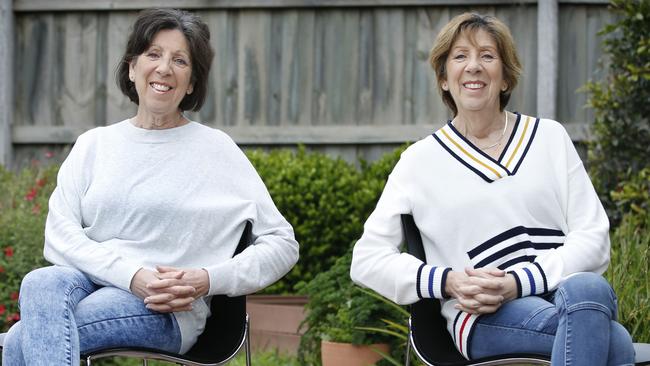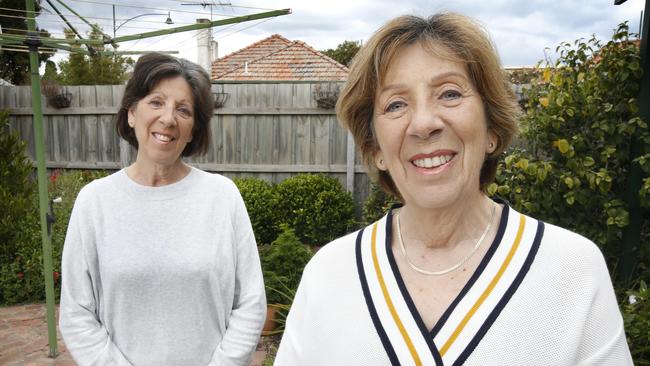Twins Raie Moss and Judy Kohn share breast cancer battles in the hope of saving others
Melbourne sisters who both battled breast cancer are taking part in a major Australian study looking at how lifestyle factors can protect against the deadly disease.

Victoria
Don't miss out on the headlines from Victoria. Followed categories will be added to My News.
There are some things even the closest of sisters would rather not share — and cancer would have to be top of the list.
But after supporting each other through matching battles with breast cancer, identical twins Raie Moss and Judy Kohn are now sharing their journey more widely in the hope of saving others.
The Melbourne sisters are taking part in a major new Australian study which aims to draw on the closeness of twins to identify factors in early life that may predict the wider risk of breast cancer.
By using twins’ matching DNA and their shared upbringings as a starting point, scientists at Twins Research Australia, based at the University of Melbourne, are hoping to gain fresh insights into how lifestyle factors can protect against breast cancer.
Lead researcher Professor John Hopper said explaining why only one twin in a pair develops breast cancer, or why a twin develops the disease earlier, may have benefits for all.
“The study makes use of twins’ unique insights into one another, especially when they were younger and living together,” Prof Hopper said.
“Twins have contributed to major breakthroughs in women’s breast cancer studies over the past two decades, revealing better ways to predict risk and improve screening.”

Studying twins has allowed scientists to identify the first gene called LSP1 that influences the density and risk of breast cancer; revealed a new epigenetic risk factor for breast cancer in the uterus; and found a new technique to interpret mammograms, highlighting those at greater risk.
Ms Kohn and Ms Moss understand the pros and cons of sharing so much. When Ms Kohn was diagnosed with oestrogen-based breast cancer in December 2013, Ms Moss knew she not only had to support her sister but also worry about her own health.
Last September Ms Moss received the same diagnosis but, a year later, both are in the clear and determined to help.
“They do say that if one twin gets it the other twin’s chances increase, so a second twin pretty much knows down the track she’s going to get it,” Ms Moss said. “I thought it would take longer, I didn’t think I’d get it within six years.
“But the beauty of being twins is that we can look after and support each other and that is really important.”
Just as twins in California have done under the international research, the sisters recently completed a thorough questionnaire and were stunned at how many of their answers were identical.
“It was something we’d rather not share — both of us would rather have not had it,” Ms Kohn said. “But it is something that needs to be studied and researched to find a cure.”
“It is amazing what they can decipher from twins.”
Pairs of both identical and fraternal adult female twins, in which one or both sisters have had breast cancer, are invited to participate in the study by registering at twins.org.au/research/current-studies.
MORE NEWS
HORRIFIC FAILINGS REVEALED DURING HOTEL INQUIRY
